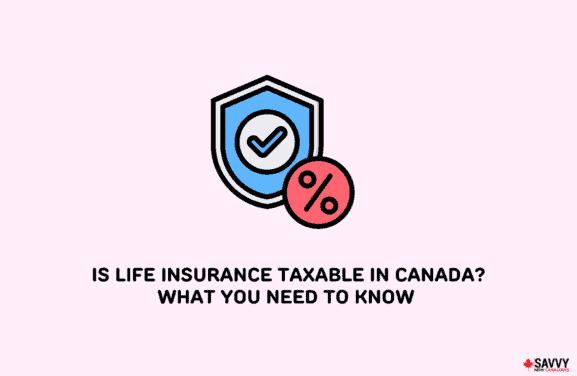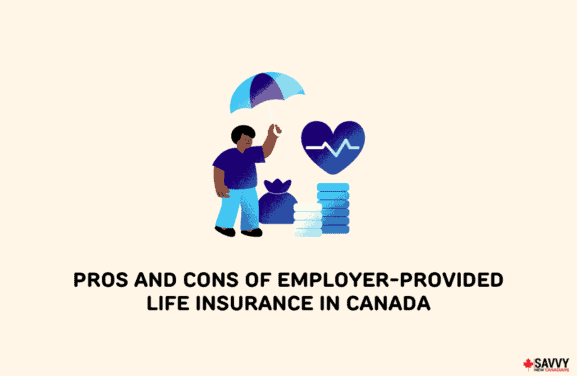Term and whole life insurance are the two main types of life insurance in Canada.
While both policies offer a financial safety net for your loved ones in the event of your death, they differ in their duration. Term insurance only provides you coverage for a specific period, while whole life insurance covers you throughout your lifetime.
This article thoroughly reviews both insurance policies, including how they work, their similarities and main differences. Learn whether term or whole life insurance is better for you based on your financial needs, goals, and budget.
Key Takeaways
- Term life insurance policies are cheaper but provide temporary coverage and don’t let you build a cash value.
- Whole life insurance policies are great for those who can afford expensive premiums, want lifelong coverage, and want to leave an inheritance to their dependents.
- The best life insurance for you depends on your financial situation, needs and goals.
Term vs Whole Life Insurance: What is the Difference?
Here are some key differences to note when looking at term vs whole life insurance.
Term Life Insurance
Temporary Coverage
A term life insurance policy offers financial protection for your loved ones in the event of your death during a specified period. You have the flexibility to choose your preferred coverage duration, but typically, policies offer terms ranging from 10 to 30 years.
Death Benefit
During the term, you must regularly pay a premium to your insurance company. If you pass away while the policy is still in effect, your beneficiaries will receive a tax-free predetermined death benefit.
Pure Life Insurance
It’s worth noting that term life insurance exclusively offers death benefits without savings or investment provisions. As a result, term life insurance policies are sometimes referred to as pure life insurance.
Whole Life Insurance
Lifetime Coverage
Also known as permanent life insurance, whole life insurance policies provide you coverage throughout your entire life. As long as you consistently pay your premiums, your loved ones will have a financial safety net regardless if you pass away early or later in life.
Death Benefit and Cash Value
Whole life insurance policies don’t just provide your beneficiaries with death benefits. They may also offer you, the insured individual, a cash value component that grows with each premium payment you make.
Access to Cash Value
You can access your cash value at your own discretion, either through withdrawals or by taking out a loan against it. Cash values grow tax-free, but there may be tax implications when you access them.
How Does Term Life Insurance Work?
Term life insurance is a very straightforward insurance policy. During the term of your coverage, you’ll make regular premium payments to the insurance company. In exchange, if you pass away within the specified period, your beneficiaries will receive a tax-free death benefit.
It’s important to understand that term life insurance is exclusively for financial protection and not a way to grow your wealth or savings. That’s because for this particular life insurance, once your coverage expires, you won’t be able to cash out the policy or receive additional benefits.
When your term life insurance expires, you’ll often have the choice to renew your policy or to convert to permanent life insurance.
PolicyMe

Affordable life insurance in Canada
Apply online in 20 minutes
Child coverage at no extra cost
Critical illness insurance coverage for 44 conditions
How Does Whole Life Insurance Work?
Unlike term life insurance policies, whole life insurance never expires. Hence, in exchange for lifetime coverage, you’ll be expected to pay the premium payments for as long as you live or within your preferred time frame.
If you consistently pay your premium payments, your beneficiaries will receive a death benefit regardless of when you pass away.
As mentioned earlier, though, your payments aren’t just for your death benefit. A part of your premiums will be used to build your cash value, which you can access tax-free as long you don’t withdraw more than what you’ve paid in premiums.
Just keep in mind that if you take a loan against or withdraw money from your cash value, the amount your beneficiaries receive as a death benefit will also be reduced.
However, on the flip side, most policies exclusively pay your beneficiaries the death benefit without the cash value, anyway. So, it’s best to weigh whether using the cash value is the best option for your financial needs.
Term vs Whole Life Insurance: Cost
1. Term Life Insurance
How much exactly you have to pay for term life insurance is often based on factors such as your age, gender, health, lifestyle and occupation. However, term life insurance costs will always be cheaper compared to whole life insurance policies.
Term life insurance will likely cost you under $100 per month if you’re a relatively healthy person. Here are the primary reasons why this type of insurance policy is more affordable.
A. No Cash Value
As you already know, term life insurance only provides your beneficiaries with death benefits. So, since this policy doesn’t offer a cash value component which increases the premium payments of whole life insurance, it’s always the cheaper option.
B. Reduced Likelihood of Payout
As you’re only covered for a specified number of years under a term life insurance, the likelihood of your insurance company needing to pay a death benefit is lower.
Due to this lower risk of payouts for the insurance company, term life insurance offers lower premiums.
2. Whole Life Insurance
While the price of whole life insurance premiums is influenced by factors such as your age, gender and health, on average, it could cost you several hundred dollars a month, which is 5 to 15 times the cost of term life insurance.
Let’s go over the key reasons why whole life insurance charges higher premiums than term life insurance.
A. Guaranteed Payout
With whole life insurance, it’s not a question of whether the insurance company will pay a death benefit but rather when it will be paid. Because of this payout certainty, insurance companies charge higher premiums, as they’re shouldering a higher level of risk and commitment.
B. Includes Cash Value
Another reason why whole life insurance premiums are higher is because this policy includes a cash value component.
Since part of what you pay for your policy goes into building this cash value, the insurance company must charge more than the amount required to provide the death benefit.
Benefits of Term Life Insurance
- You pay lower premiums.
- Term life insurance is simple and easy to understand.
- After the term, you may renew your policy or convert it to whole life insurance.
Benefits of Whole Life Insurance
- The insurance coverage never expires.
- Some insurance companies let you earn dividends.
- It accumulates cash value that you can withdraw or borrow against.
Downsides of Term Life Insurance
- There’s no cash value.
- When you renew your policy, your premium increases.
- If you outlive your insurance term, your policy will expire and won’t bring you value.
Downsides of Whole Life Insurance
- Its premiums are more expensive.
- Whole life insurance can be harder to understand as it combines insurance and investments.
- The rate of return of cash values is often lower than what you can earn through other investment opportunities.
- The cash value doesn’t go to your beneficiaries when you pass away.
Is Whole Life Better Than Term Life Insurance?
Whole life insurance and term life insurance serve different financial goals and purposes. So, these policies shouldn’t be compared head-to-head as better or worse than the other.
In order to know which one is the better life insurance option for you, you should consider several factors, such as your financial needs, goals, and current life circumstances.
Remember, when it comes to insurance and many financial products, the best option for one is not necessarily going to be the best option for another.
How to Choose Between Whole and Term Life Insurance
Consider these factors when choosing between whole and term life insurance.
When To Pick Term Life Insurance
Term life insurance is ideal for those who only want coverage when they have temporary major financial obligations, such as paying off a mortgage or raising young children.
Moreover, this policy is great for those looking at affordable insurance options, as its premiums are typically 5 to 15 times cheaper than those of whole life insurance.
Remember, term life insurance policies also usually let you renew your policy or convert it to whole life insurance once your term expires, so this insurance type is also a great option if you value flexibility in your long-term financial planning.
One of the best life insurance companies in Canada for term life insurance is PolicyMe.
When To Pick Whole Life Insurance
Whole life insurance is a viable option if you want lifelong coverage and can comfortably afford the expensive premiums. It offers you the benefit of having a cash value you can access anytime and allows you to leave an inheritance to your kids when you pass away.
For parents with lifelong dependents, such as children with disabilities, whole life insurance can be the better pick. That’s because this insurance type can establish a trust fund that’ll take care of your dependent after you’re gone.
FAQs
No, you don’t get your money back at the end of term life insurance. If you outlive your policy, you’ll receive no further value from the insurance, as its only purpose is to provide death benefits to your beneficiaries.
At the end of a 20-year term life insurance policy, you’ll have the option to renew your insurance or convert it to a whole life insurance policy. You won’t receive any of the money you’ve paid for the insurance back.
Most experts recommend term life insurance. This policy is cost-effective and easier to understand, making it suitable for most individuals and families.
The biggest risk for buying whole life insurance is the total amount you invest into the policy. If you miss your payments, you might end up forfeiting the policy, making you lose your coverage and the cash value you’ve built.
Related:



